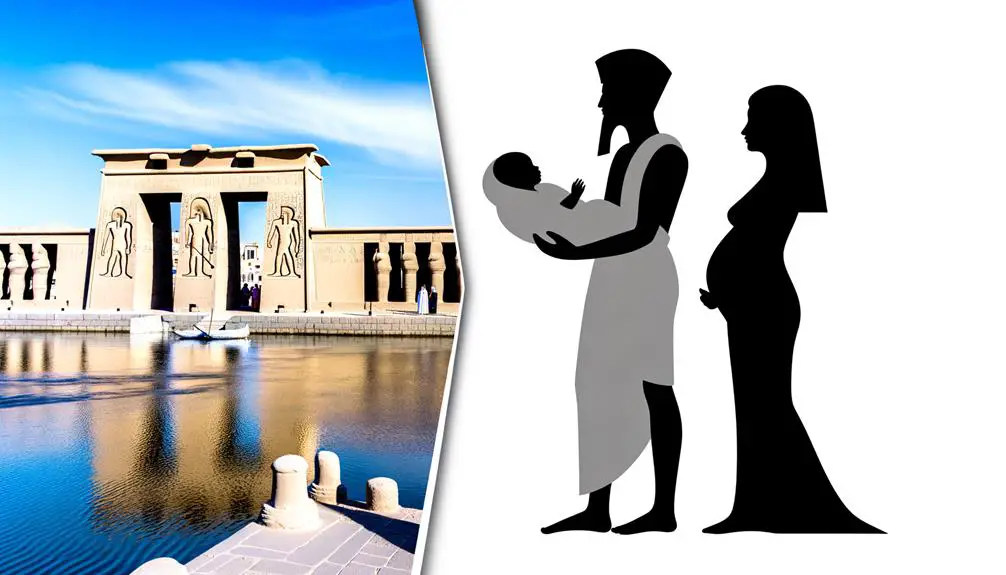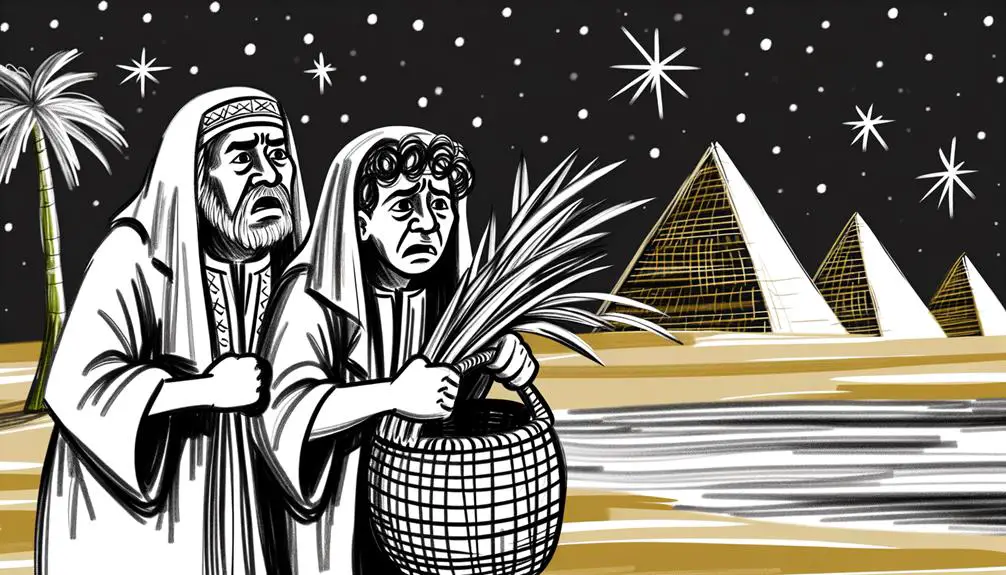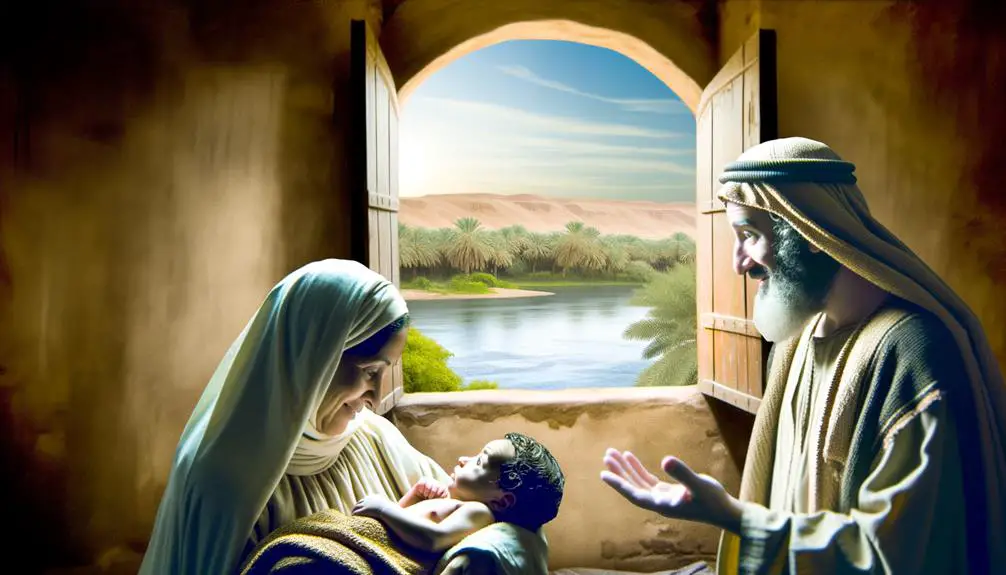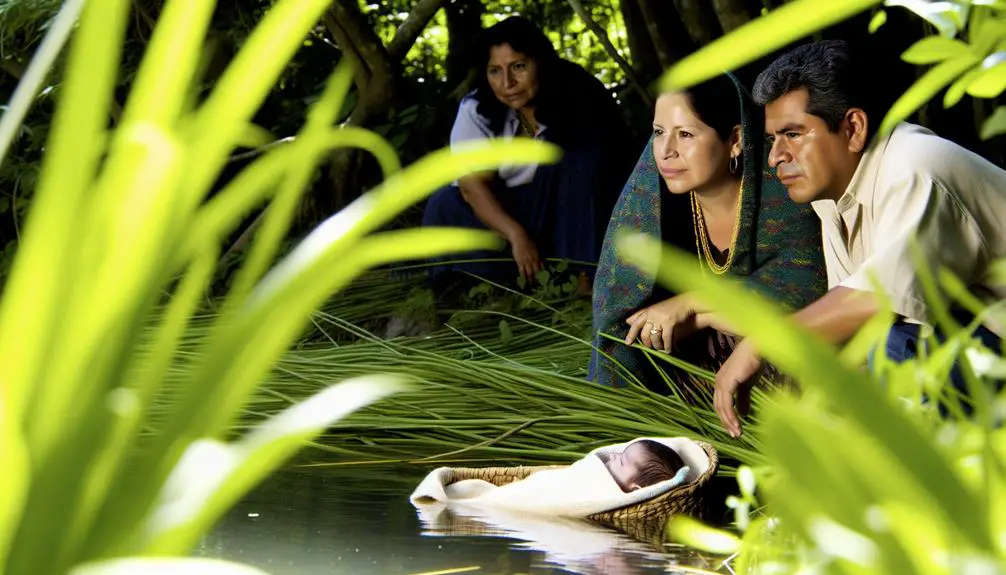Know the unsung heroes behind Moses—his parents' courageous acts shaped the Exodus story, uncover their legacy and why it still resonates.

Parents of Moses in the Bible
In the grand tapestry of biblical narratives, you'd think the parents of Moses would have their own PR team, considering their son's A-list status among prophets. Yet, Amram and Jochebed, his not-so-famous parents, played a paramount role in shaping the destiny of the Israelites.
Their story, set against the backdrop of oppression in Egypt, is not just a tale of survival but of astute defiance. As you explore their lineage, challenges, and the daring act of protecting Moses, you'll uncover layers of faith, courage, and ingenuity that set the stage for one of history's greatest liberation stories.
Why their legacy matters in today's context is a journey worth embarking on.
Key Takeaways
- Moses' parents were descendants of Levi, instilling in him strong Levite traditions and values.
- They defied Pharaoh's decree by hiding Moses, demonstrating immense faith and bravery.
- Their ingenious plan involved placing Moses in the Nile, ensuring his survival and future legacy.
- Their actions exemplify the power of individual courage and faith in shaping history and inspiring future generations.
The Lineage of Amram and Jochebed

Delving into the lineage of Amram and Jochebed, it's pivotal to recognize that they're rooted in a rich biblical heritage, directly descending from Levi, one of the twelve sons of Jacob. This connection places them squarely within the Levite traditions, a distinction that carries significant religious and cultural weight within the context of their time. As Levites, they're part of a tribe chosen for religious duties, a lineage that profoundly shapes their family dynamics and the upbringing of their children, including Moses.
You'll find that Levite traditions aren't just about religious rites; they deeply influence the family's values, education, and social responsibilities. Amram and Jochebed, adhering to these traditions, would have instilled in their children a profound understanding of their roles within their community. This background is crucial in understanding the environment Moses was born into, an environment steeped in a sense of duty, devotion, and a deep connection to their heritage.
Moreover, the family dynamics within the household of Amram and Jochebed, shaped by Levite traditions, likely fostered a strong sense of identity and purpose. It's within this framework that Moses's early life unfolds. His parents' lineage and adherence to their ancestral traditions provided a foundation that not only influenced Moses's upbringing but also prepared him for the significant role he'd later play.
Understanding the lineage of Amram and Jochebed thus offers insight into the complex interplay between heritage, family dynamics, and individual destiny in biblical narratives. Their story is a testament to the enduring impact of Levite traditions on their descendants, shaping leaders who'd leave a lasting legacy.
Exodus Context and Challenges

The Exodus presents a pivotal moment in biblical history, characterized by both its monumental challenges and the profound faith of those navigating through them. You're stepping into a timeline where the Hebrews' cry for deliverance from enslavement under Pharaoh echoes through the corridors of history. Pharaoh's decree to kill all newborn Hebrew boys was not just a cruel edict but a test of faith and resilience for the Hebrew people, including the parents of Moses.
Challenge |
Impact on Hebrews |
|---|---|
Pharaoh's Decree |
Immediate threat to the Hebrew lineage, instilling fear and despair among the families. |
Hebrew Enslavement |
Severe labor and oppression diminished hope and tested faith, yet also forged a strong communal identity. |
Divine Intervention |
Provided a glimmer of hope, demonstrating that amidst seemingly insurmountable challenges, deliverance was possible. |
This period was not just about survival; it was about maintaining identity and faith in the face of relentless adversity. Hebrew enslavement was an experience that bonded the community, teaching them the power of unity and perseverance. Pharaoh's decree tested the moral fiber of the Hebrew people, pushing them to make unimaginable decisions to protect their families and future generations.
As you delve into this chapter of biblical history, you're not just recounting events; you're exploring the depths of human resilience and faith. The Exodus story, with its challenges and triumphs, serves as a testament to the enduring spirit of a people determined to overcome adversity and claim their freedom.
The Birth of Moses

Amid the terror of Pharaoh's decree and the resilience of the Hebrew people, Moses' birth emerges as a beacon of hope, marking the dawn of a pivotal chapter in biblical history. You're stepping into a time when the Egyptian ruler, threatened by the growing population of Hebrews, issued a heart-wrenching command to kill all newborn Hebrew boys. This dark period illuminates the courage of two groups: Moses' family and the Hebrew midwives.
Moses' parents, Amram and Jochebed, faced an unimaginable decision following Pharaoh's decree. Their faith and bravery in such a dire time are palpable, as they chose to hide their newborn son, defying the Pharaoh's orders. This act alone speaks volumes about their resilience and hope for their people's future.
Equally remarkable is the midwife defiance. The biblical narrative introduces Shiphrah and Puah, the midwives who were instructed to carry out Pharaoh's cruel directive. Their resistance, however, is a testament to their moral courage and fear of God over the king. They saved many lives by their cunning refusal to follow through with the killings, telling Pharaoh that the Hebrew women were vigorous and gave birth before they could arrive. This act of defiance not only protected the newborns but also preserved the future liberator of the Hebrew people, Moses.
Moses' birth, then, isn't just the start of his own story but a reflection of the collective courage and faith of those around him. It's a narrative of hope, resilience, and defiance against oppression, setting the stage for one of the most significant chapters in the history of the Hebrew people.
Protecting Moses

In an act of profound courage, Moses' parents ingeniously crafted a plan to protect their son from Pharaoh's deadly decree. Faced with the unimaginable threat of losing their child to the Egyptian ruler's command that all Hebrew baby boys be killed, they resorted to an innovative concealment strategy. Understanding the stakes, they didn't allow fear to paralyze them; instead, they acted with determination and shrewdness.
Their plan involved creating a waterproof basket, a small vessel that would serve as a floating cradle for Moses. This wasn't merely an act of desperation but a calculated move, leveraging what they'd at their disposal. They placed Moses in this basket and set it adrift on the Nile River. This river strategy wasn't only about hiding Moses but also about entrusting him to a higher power, hoping for a miracle.
The choice of the river was strategic. The Nile, central to Egyptian civilization, was often monitored, yet Moses' parents counted on the compassion of those who might find their son. Indeed, it was Pharaoh's own daughter who discovered Moses, moved by empathy to raise him as her own. This twist of fate turned the river strategy into a masterstroke of survival and defiance.
Moses' parents' actions speak volumes about their faith and foresight. In protecting their son, they didn't just save a life; they set in motion a series of events that would forever alter the course of their people's history. Their innovative concealment and river strategy were acts of both love and rebellion, underlining the lengths to which they'd go to safeguard their child.
Legacy and Significance

Their daring act of faith and ingenuity, in saving Moses, didn't just secure their son's survival; it laid the groundwork for what would become a pivotal moment in religious and cultural history. They exemplified faithful courage, a quality that's been celebrated through generations. You see, the actions of Moses' parents were far more than a desperate attempt to save their child; they were acts of profound belief in the possibility of a better future, not just for their son but for an entire people. This makes them hidden heroes in the narrative, whose legacy transcends the immediate rescue of Moses.
The significance of their deed lies not only in its immediate outcome but in its lasting impact on the collective consciousness of a faith community. They remind us that courage and faith often operate in the shadows, far from the spotlight, shaping history in ways that are only recognized in hindsight. Their story is a powerful testament to the idea that significant change often begins with the quiet, steadfast hearts of those who dare to hope and act against seemingly insurmountable odds.
Moreover, their legacy is a call to recognize and honor the hidden heroes in our own stories and communities. It challenges you to see that acts of faithful courage, no matter how small or unseen, can ripple through time, inspiring future generations to pursue justice, freedom, and truth. In essence, the narrative of Moses' parents urges you to acknowledge the power of individual action intertwined with faith, in crafting the arc of history.
Frequently Asked Questions
How Did the Religious Beliefs of Moses' Parents Influence His Later Actions and Decisions as a Leader?
Your question delves into how parental faith shapes a leadership legacy.
It's evident that strong religious beliefs, instilled from an early age, can profoundly influence one's decisions and actions as a leader. This foundation often guides leaders through challenging situations, encouraging them to make choices that align with their moral compass.
In essence, the deep-rooted faith of one's parents doesn't just influence; it molds the very essence of their leadership approach.
Were There Any Specific Egyptian Cultural Practices or Norms That Moses' Parents Adopted or Adapted to During Their Time in Egypt?
Diving into the heart of ancient Egypt, you'll find that its rich culture, from towering pyramids to intricate hieroglyphs, left an indelible mark on its inhabitants. Specifically, Egyptian architecture and clothing styles weren't just for show; they reflected societal values and norms.
Analyzing these elements, you'll understand how individuals, immersed in this environment, might adapt or even adopt certain practices, showing respect for the culture while maintaining their own identity.
How Did the Community Around Moses' Parents React to the Decree of Pharaoh Regarding the Killing of Hebrew Baby Boys?
When faced with the decree to kill Hebrew baby boys, the community around you likely felt intense fear, yet there was an undercurrent of secret resistance.
In such oppressive times, you'd find that fear didn't paralyze everyone; instead, it galvanized a quiet, yet determined defiance.
This collective courage, hidden from the oppressor's eyes, showcased the resilience and solidarity of a community pushed to its limits but refusing to break.
Are There Any Traditional or Folk Stories Not Found in the Bible That Elaborate on the Personalities or Lives of Moses' Parents?
Certainly, you're curious about ancestral tales that transcend traditional texts, specifically those showcasing parental courage. These stories, often passed down through generations, provide a richer understanding of historical figures.
Regarding Moses' parents, folklore enriches their narrative, offering insights into their personalities and lives beyond biblical accounts. Such tales not only celebrate their bravery but also connect us more deeply to their enduring legacy, illustrating the profound impact of their actions through generations.
What Role Did Moses' Parents Play in the Early Education and Spiritual Formation of Moses Before He Left Egypt?
Moses' early years were pivotal, and though details are scarce, it's believed his parents had a significant role. Before his early separation, they likely imparted foundational lessons, embedding spiritual beliefs and Hebrew heritage through hidden education.
This period was crucial, shaping Moses' identity and values, despite the brief time with his family. Their influence, though not elaborately documented, was essential in preparing him for his future leadership and mission.
Conclusion
So, after navigating the treacherous waters of Exodus, dodging Pharaoh's decree like it's nobody's business, and pulling off a baby-in-a-basket stunt that would make any modern-day escape artist green with envy, Amram and Jochebed truly set the bar for parental ingenuity.
Their story isn't just an ancient bedtime tale; it's a masterclass in divine loophole exploitation and undercover parenting.
Frankly, their legacy is less about being mere progenitors and more about being the ultimate dynamic duo in biblical problem-solving.



Sign up